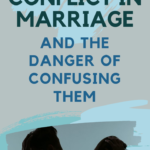There is no one-size-fits-all for dealing with marriage problems, because not all types of conflict are alike.
This month, our Wednesday series is all about reducing stress in marriage and getting to the root of what’s really bothering you. Last week we talked about how to uncover the sources of stress in our lives, and today I want to look at the different types of marriage problems that we may experience.
And thank you to the Get Your Marriage On app for sponsoring this series!
When Keith and I started speaking at FamilyLife marriage conferences, we were given a curriculum used by FamilyLife USA for the Weekend to Remember, and we had to adapt our talks to fit the curriculum. But I always found the resolving types of conflict difficult, and it always felt like I was trying to put square pegs into round holes (which is why I’m glad that Canada rewrote the entire weekend and does it very differently now!). Part of the issue was that the types of conflict talk always focused on when there is a big disagreement, and then it focused on how to give and grant forgiveness. But not all conflict falls into those categories.
Why focus on forgiveness if you’ve just been having a simple difference of opinion, and you’ve had a hard time figuring out how to make a decision? Why focus on how to listen better if your spouse is watching porn or having an affair or abusing you? Different issues require different strategies.
So I’ve been thinking about a better way to picture types of conflict in marriage.
I’ve talked about part of this before–in this post on Why I’ve Stopped Resolving Conflict. It’s an important one on how to come to an agreement, and it focuses on a key teaching in my book 9 Thoughts That Can Change Your Marriage about the importance of identifying the underlying emotional need and then brainstorming to meet it, rather than squabbling over the correct course of action. That’s actually a lot more productive!
Today I’d like to take that one step further and break down the different types of conflict in a marriage, and why it’s important to deal with them differently.
I think types of conflicts in marriage can be divided into three different root causes: character issues, personal issues, and relationship issues.
Let’s see what that looks like!
Types of Conflict: Character Issues. When marital conflict is due to one person’s sin
Sometimes the reason we’re having conflict in a marriage is because one person is doing something wrong. They may be overspending and going into debt, and refusing to talk about budgets. They may be refusing to work, and relying on their spouse to do 90% of the housework and paid work. They may be watching porn or having an affair. They may be abusive, either physically, emotionally, financially, or sexually. (And, yes, men can be victims of abuse, too).
In all of these cases, one person is doing something that is harming the marriage.
How this should be addressed: Boundaries must be drawn so that the spouse doing wrong understands that this will not be tolerated and so that the spouse begins to reap the consequences of their actions. They don’t get to have the benefits of marriage if they are also destroying the marriage. Ideally, people can be brought into the relationship to tell the offending spouse that this will not be tolerated in their wider social circle, either. Counselling can be sought, but it primarily should be individual counselling, especially in cases of abuse, where couples counseling often provides the abuser another way to traumatize the victim.
Where we may go wrong: Unfortunately, a lot of marriage teaching, especially in the church, focuses on being more giving and more selfless (and they often use Bible verses about how Jesus gave up everything to give this message). However, this is taking the biblical mandate to be selfless out of context. We need to remember God’s aim: He wants us to look like Christ. Enabling sin does not help people move towards Christlike behaviour. And God also cares about our welfare! Allowing someone to hurt us does not accomplish God’s plans. As well, counselling in these situations may focus on how to improve communication, or how to spend more time together and have more date nights. But when someone is seriously hurting the marriage, that must be addressed before we work on anything else.
For examples of how counseling can go wrong, see this list of 98 ways a woman can sin against her husband. This list was given to a woman whose husband had been abusive and had been having an affair, and is a great example of handling sinfulness the entirely wrong way. Counseling can be a wonderful tool, but it must be good counseling.
Types of Conflict: Individual Issues. When marital conflict is due to one person’s hurt and unresolved problems
Some people start marriage with a lot more baggage than others. They were hurt, neglected, or belittled growing up, and so they have little sense of self or little confidence. That may lead to someone who becomes angry at the drop of a hat because they don’t want to be seen as “less than”. Alternatively, it could lead to someone having no drive in life and having difficulty getting a job because they’re so passive. Or maybe they were abused growing up, and have difficulty handling anger or handling any kind of conflict whatsoever. Or perhaps that abuse was sexual, and that sexual abuse is wreaking havoc with their sex life.
We all are a little bit broken, but some people’s brokenness takes a much bigger toll on the marriage. Healing from hurts can often take a lot of time and effort, and it can be quite emotionally difficult to even start that healing process. It requires facing things that you went through that you may not yet be ready to face.
The other problem is that brokenness can cross over and become selfishness. Broken people can become abusive (though not all do). Broken people can become lazy and have a difficult time getting a job, or can have a difficult time doing basic parenting tasks and can neglect the children. Not all sinful behaviour is caused by brokenness, but some is, and so untangling the mess becomes very difficult.
How this should be addressed: When the brokenness is not causing abusive behaviour, but simply self-destructive behaviour or relational problems, two things are needed: a ton of patience and love, and encouragement to get qualified help. Love unconditionally. Let the spouse know that they are safe. But also tell them that you care about them, and you don’t want to see them stuck. You want to help them as they get healing. In many ways, this is part of the “in sickness and in health” vows that we make at the wedding. Some people have much more sickness, and that sickness is not always physical. When the brokenness is also causing sinfulness, as above, then boundaries need to be set and individual counseling should be pursued to deal with the harmful behavior first. Then, any true healing will have to also address the underlying causes.
Where we may go wrong: We may get the wrong kind of counseling. Rachael Denhollander said, about abuse victims and trauma survivors, that she has never met anyone who went to biblical counseling who did not come out worse off. Find a licensed counselor (preferably one who is also a Christian) who understands trauma and knows evidence based treatments.
Types of Conflict: Relationship Issues. When marital conflict is due to two people seeing the world and their relationship in different ways
Then there are just the normal differences that any couple has–you have different love languages or different emotional needs. Because of that, you don’t always feel loved. Maybe you’re very different personalities (I have a great series on the MBTI and marriage which can point out some of these big differences!). Or maybe you’re simply disagreeing on a decision, and you can’t seem to figure out what to do.
How this should be addressed: Take the emotional needs quiz below! It’s a great tool to help you identify what you each need to feel loved that goes beyond love languages. Figure out what personality type you are so that you can understand each other better and make allowances for each other. Follow the game plan I laid out in 9 Thoughts that Can Change a Marriage for coming to agreements when it seems like you’re at an impasse. If necessary, talk to other people or get some couples counseling to help you connect more.
Where we may go wrong: One person may decide to just “give in” and be giving, and may do this repeatedly, thinking that by surrendering more they are doing the right thing in their marriage. However, when this imbalance keeps up, year after year and decade after decade, the drift can get worse. We should be showing grace, letting little things go, and not insisting on our own way. However, if this is taken too far, with no consideration given to one person’s needs, then giving in can actually cause more problems. Like I talked about last week in my post on how to build a good marriage, both people matter in a marriage. You can’t have intimacy if one person’s needs are consistently being ignored. If this is the case in your marriage, talk about it. Be bold. And seek counseling if necessary.
Another potential landmine that I’ve seen repeatedly is that, if there’s a disagreement, it’s assumed that you should just do what the husband wants because the wife is to submit to him. However, this both misunderstands submission and short circuits what God may be doing in the marriage. It’s far better to seek His will, not just to do the husband’s will.
So there you go–the 3 different types of conflict in marriage, and how they should be dealt with.
We should not use a one-size-fits-all approach, like “you just need more date nights!” or “you need couples counseling!”. No, sometimes you need individual counseling. Sometimes you need to be more giving; sometimes you need to be bold and draw boundaries. When you treat abuse as if it’s just a disagreement, you make the abuse worse. But when you treat a simple disagreement, or not understanding love languages, as if it’s a big sin or evidence of selfishness, you create a whole host of other problems.
Hope this helps as you navigate the three different types of conflict in your marriage.


